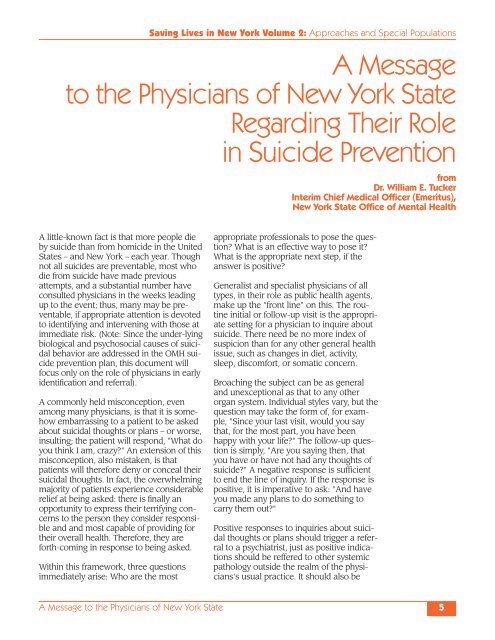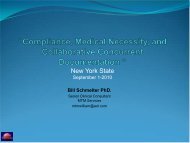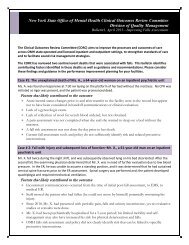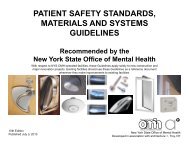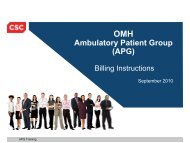Saving Lives in <strong>New</strong> <strong>York</strong> Volume 2: Approaches and Special Populations K. Tryptophan hydroxylase immunoreactivity is altered by the genetic variation in postmortem brain samples <strong>of</strong> both suicide victims and controls. Mol Psychiatry. 2002;7:1127- 1132. 32. Mann, J.J., Huang, Y., Underwood, M.D., Kassir, S.A., Oppenheim, S., Kelley, T.M., Dwork, A.J., Arango, V. A serotonin transporter gene promoter polymorphism (5-HTTLPR) and prefrontal cortical binding in major depression and suicide. Arch Gen Psychiatry. 2000;57:729-738. 33. Shallice, T., Burgess, P. The domain <strong>of</strong> supervisory processes and temporal organization <strong>of</strong> behavior. Phil Trans R Soc Lond. 1996;351:1405-1412. 34. Damasio, H., Grabowski, T., Frank, R., Galaburda, A.M., Damasio, A.R. The return <strong>of</strong> Phineas Gage: Clues about the brain from the skull <strong>of</strong> a famous patient. Sci. 1994;264:1102-1105. 35. Mann, J.J., Malone, K.M., Diehl, D.J., Perel, J., Cooper, T.B., Mintun, M.A. Demonstration in vivo <strong>of</strong> reduced serotonin responsivity in the brain <strong>of</strong> untreated depressed patients. Am J Psychiatry. 1996;153:174-182. 36. Oquendo, M.A., Placidi, G.P., Malone, K.M., Campbell, C., Keilp, J., Brodsky, B., Kegeles, L.S., Cooper, T.B., Parsey, R.V., Van Heertum, R.L., Mann, J.J. Positron emission tomography for regional brain metabolic responses to a serotonergic challenge and lethality <strong>of</strong> suicide attempts in major depression. Arch Gen Psychiatry. 2003;60:14-22. 37. Higley, J.D., Thompson, W.W., Champoux, M., Goldman, D., Hasert, M.F., Kraemer, G.W., Scanlan, J.M., Suomi, S.J., Linnoila, M. Paternal and maternal genetic and environmental contributions to cerebrospinal fluid monoamine metabolites in Rhesus monkeys (Macaca mulatta). Arch Gen Psychiatry. 1993;50:615-623. 38. Traskman, L., Asberg, M., Bertilsson, L., Sjostrand, L. Monoamine metabolites in CSF and suicidal behavior. Arch Gen Psychiatry. 1981;38:631-636. 39. Pitchot, W., Reggers, J., Pinto, E., Hansenne, M., Fuchs, S., Pirard, S., Ansseau, M. Reduced dopaminergic activity in depressed suicides. Psychoneuroendocrinology. 2001;26:331-335. 40. Arango, V., Underwood, M.D., Mann, J.J. Fewer pigmented locus coeruleus neurons in suicide victims: Preliminary results. Biol Psychiatry. 1996;39:112-120. 41. Arango, V., Ernsberger, P., Sved, A.G., Mann, J.J. Quantitative autoradiography <strong>of</strong> a1 B a2-adrenergic receptors in the cerebral cortex <strong>of</strong> controls and suicide victims. Brain Res. 1993;630:271-282. 42. Fawcett, J., Busch, K.A., Jacobs, D., Kravitz, H.M., Fogg, L. Suicide. A four-pathway clinical-biochemical model. Ann NY Acad Sci. 1997;836;288-301. 43. Carroll, B.J., Feinberg, M., Greden, J.F., Tarika, J., Albala, A.A., Haskett, R.F., James, N.M., Kronfol, Z., Lohr, N., Steiner, M., deVigne, J.P., Young, E. A specific laboratory test for the diagnosis <strong>of</strong> melancholia. Standardization, validation, and clinical utility. Arch Gen Psychiatry. 1981; 38:15-22. 44. Bunney, W.E., Jr., Fawcett, J.A., Davis, J.M., Gifford, S. Further evaluation <strong>of</strong> urinary 17-Hydrocorticosteroids in suicidal patients. Arch Gen Psychiatry. 1969;21:138-150. 45. Nemer<strong>of</strong>f, C.B., Owens, M.J., Bissette, G., Andorn, A.C., Stanley, M. Reduced corticotropin releasing factor binding sites in the front cortex <strong>of</strong> suicidal victims. Arch Gen Psychiatry. 1988;45:577-579. 46. Roy, A. Family history <strong>of</strong> suicide. Arch Gen Psychiatry. 1983;40:971-974. 47. Roy, A., Segal, N.L., Centerwall, B.S., Robinette, C.D. Suicide in twins. Arch Gen Psychiatry. 1991;48:29-32. 48. Roy, A., Segal, L.N., Sarchiapone, M. Attempted suicide among living co-twins <strong>of</strong> twin suicide victims. Am J Psychiatry. 1995;152:1075-1076. 49. Schulsinger, F., Kety, S.S., Rosenthal, D., Wender, P.H. A Family study <strong>of</strong> Suicide. In: Schou M, Stromgren, E, eds. Origin, Prevention and Treatment <strong>of</strong> Affective Disorders. <strong>New</strong> <strong>York</strong>: Academic Press; 1979:277-287. 50. Brent, D.A., Bridge, J., Johnson, B.A., Connolly, J. Suicidal behavior runs in families. A controlled family study <strong>of</strong> adolescents suicide victims. Arch Gen Psychiatry. 1996;53:1145- 1152. 51. Brent, D.A., Oquendo, M., Birmaher, B., Greenhill, L., Kolko, D., Stanley, B., Zelazny, J., Brodsky, B., Bridge, J., Ellis, S., Salazar, J.O., Mann, J.J. Familial pathways to early-onset suicide attempt: risk for suicidal behavior in <strong>of</strong>fspring <strong>of</strong> mood-disordered suicide attempters. Arch Gen Psychiatry. 2002;59:801-807. 52. Viau, V., Sharma, S., Meaney, M.J. Changes in plasma adrenocorticotropin, corticosterone, corticosteroid-binding globulin, and hippocampal glucocorticoid receptor occupancy/translocation in rat pups in response to stress. J. Neuroendocrinology. 1996;8:1-8. 53. Baldessarini, R.J., Tondo, L., Hennen, J. Effects <strong>of</strong> lithium treatment and its discontinuation on suicidal behavior in bipolar manic-depressive disorders. J Clin Psychiatry. 1999;60(suppl 2):77-84. 54. Nilsson, A. Lithium therapy and suicide risk. J Clin Psychiatry. 1999;60(suppl2):85-88. 55. Meltzer, H.Y., Okayli, G. Reducation <strong>of</strong> suicidality during clozapine treatment <strong>of</strong> neuroleptic-resistant schizophrenia: Impact on risk-benefit assessment. Am J Psychiatry. 1995;152:183-190. 56. Walker, A.M., Lanza, L.L., Arellano, F., Rothman, K.J. Mortality in current and former users <strong>of</strong> clozapine. Epidemiology. 1997;8:671-677. 57. Reid, W.H., Mason, M., Hogan, T. Suicide prevention effects associated with clozapine therapy in schizophrenia and schizoaffective disorder. Psychiatric Services. 1998;49:1029- 1033. 58. Mann, J.J. Violence and Aggression In Bloom FE, Kupfer DJ, eds. Psychopharmacology: The Fourth Generation <strong>of</strong> Progress. <strong>New</strong> <strong>York</strong>: Raven Press; 1995:1919-1928. 4 Neurobiological Aspects <strong>of</strong> Suicide
Saving Lives in <strong>New</strong> <strong>York</strong> Volume 2: Approaches and Special Populations A Message to the Physicians <strong>of</strong> <strong>New</strong> <strong>York</strong> <strong>State</strong> Regarding Their Role in Suicide Prevention from Dr. William E. Tucker Interim Chief Medical <strong>Office</strong>r (Emeritus), <strong>New</strong> <strong>York</strong> <strong>State</strong> <strong>Office</strong> <strong>of</strong> <strong>Mental</strong> <strong>Health</strong> A little-known fact is that more people die by suicide than from homicide in the United <strong>State</strong>s – and <strong>New</strong> <strong>York</strong> – each year. Though not all suicides are preventable, most who die from suicide have made previous attempts, and a substantial number have consulted physicians in the weeks leading up to the event; thus, many may be preventable, if appropriate attention is devoted to identifying and intervening with those at immediate risk. (Note: Since the under-lying biological and psychosocial causes <strong>of</strong> suicidal behavior are addressed in the OMH suicide prevention plan, this document will focus only on the role <strong>of</strong> physicians in early identification and referral). A commonly held misconception, even among many physicians, is that it is somehow embarrassing to a patient to be asked about suicidal thoughts or plans – or worse, insulting; the patient will respond, "What do you think I am, crazy?" An extension <strong>of</strong> this misconception, also mistaken, is that patients will therefore deny or conceal their suicidal thoughts. In fact, the overwhelming majority <strong>of</strong> patients experience considerable relief at being asked: there is finally an opportunity to express their terrifying concerns to the person they consider responsible and and most capable <strong>of</strong> providing for their overall health. Therefore, they are forth-coming in response to being asked. Within this framework, three questions immediately arise: Who are the most appropriate pr<strong>of</strong>essionals to pose the question? What is an effective way to pose it? What is the appropriate next step, if the answer is positive? Generalist and specialist physicians <strong>of</strong> all types, in their role as public health agents, make up the "front line" on this. The routine initial or follow-up visit is the appropriate setting for a physician to inquire about suicide. There need be no more index <strong>of</strong> suspicion than for any other general health issue, such as changes in diet, activity, sleep, discomfort, or somatic concern. Broaching the subject can be as general and unexceptional as that to any other organ system. Individual styles vary, but the question may take the form <strong>of</strong>, for example, "Since your last visit, would you say that, for the most part, you have been happy with your life?" The follow-up question is simply, "Are you saying then, that you have or have not had any thoughts <strong>of</strong> suicide?" A negative response is sufficient to end the line <strong>of</strong> inquiry. If the response is positive, it is imperative to ask: "And have you made any plans to do something to carry them out?" Positive responses to inquiries about suicidal thoughts or plans should trigger a referral to a psychiatrist, just as positive indications should be reffered to other systemic pathology outside the realm <strong>of</strong> the physicians's usual practice. It should also be A Message to the Physicians <strong>of</strong> <strong>New</strong> <strong>York</strong> <strong>State</strong> 5


